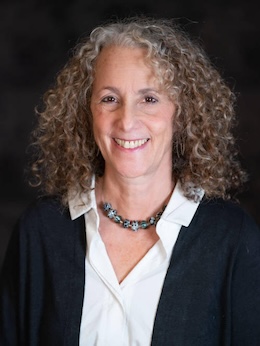Rabbi Elyse Goldstein delved into the impact of women’s evolving roles in Judaism during a webinar hosted by Kolot Mayim Reform Temple on Dec. 8. Her talk – Open Doors, Open Hearts: How Women Have Enriched Judaism – was part of the Victoria synagogue’s 2024-25 lecture series.
Using her own journey, the rabbi emerita of City Shul in Toronto explored how women’s leadership and scholarship have not only enriched the Jewish community but also transformed it for the better.
From her vantage point as a (recently) retired rabbi, Goldstein asserted that Jewish feminism has been a lifeline to Judaism over the past several decades. She referred to the profound changes within Judaism regarding the involvement of women as “disruptions” in the positive sense of the word: namely, “a societal thought pattern that profoundly changes everything around it.”

For Goldstein personally, a disruptive point arrived during her bat mitzvah. When it was time for her speech, she announced to the congregation – to the widespread gasps of those assembled and the dismay of her rabbi – that she, too, wanted to become a rabbi.
“I never really thought when I was 13 that women becoming rabbis would shake the very foundations of Judaism,” she said. That women “would question every assumption of Jewish life, which was based on patriarchal power, that they would challenge what it means to be a Jew altogether. I didn’t realize that I was in the middle of a quiet revolution that would not remain quiet.
“One of the biggest disruptions of Jewish feminism to Jewish life is that people who identify as female are going to lead not in spite of being female but because of it. In other words, that’s a big part of who they are. That is part of their self-identity and they’re going to lead from within that identity – not push it aside.”
The changes brought about by women becoming leaders appear, Goldstein said, in the pages of prayer books, in seminaries, in the boardrooms of Jewish organizations, yeshivot and the Israeli government.
“Our liturgy would change to not only include the matriarchs,” Goldstein said. “We would use neutered language for God and start singing songs of Miriam in summer camp. We would learn Talmud from Orthodox women. We would feel empowered to create midrashim (interpretations of the Bible).”
She referred to the first stage of Jewish feminism as “equal access Judaism,” or the idea that women should be given the same religious opportunities and responsibilities as men.
The second stage, Goldstein said, went further by questioning notions, not simply behaviours.
“It challenged the way we think and our theological language in describing God,” she said. “It began to shake the foundational assumptions about women and men, Jewish tradition and Jewish law. We didn’t just have women rabbis – those rabbis made us rethink not so much about what a rabbi looks like but what a rabbi is.”
We are in the third stage of Jewish feminism, one that considers if there is more that can be done, she said. “We have to ask about violence against women in the Jewish community and if that’s ended. We have to examine the court system in Israel, where women are still routinely denied Jewish divorces. We have to talk about the ordination of Orthodox women and how that is happening … and we’re not paying attention to it.”
Goldstein went on to talk about what are, in her view, four disruptions to Jewish life brought on by Jewish feminism: the ordination of female rabbis, starting in 1972; Jewish rituals that speak more directly to the experiences of women; changes in religious garb, with, for example, women in a congregation wearing tallitot (prayer shawls); and the reshaping of the gender-related language pertaining to God.
In addition to being the founding rabbi of City Shul, Goldstein started Kolel: The Adult Centre for Liberal Jewish Learning. An award-winning educator, a writer and a community activist, she has lectured across North America, Israel and the United Kingdom. Her works include ReVisions: Seeing Torah through a Feminist Lens and, as editor, The Women’s Torah Commentary.
Ben M. Freeman will present the next lecture in the Kolot Mayim series, on Jan 12. The author of the Jewish Pride trilogy, Freeman will discuss his latest book, The Jews: An Indigenous People, which will be released in February. Visit kolotmayimreformtemple.com to register for upcoming talks.
Sam Margolis has written for the Globe and Mail, the National Post, UPI and MSNBC.
